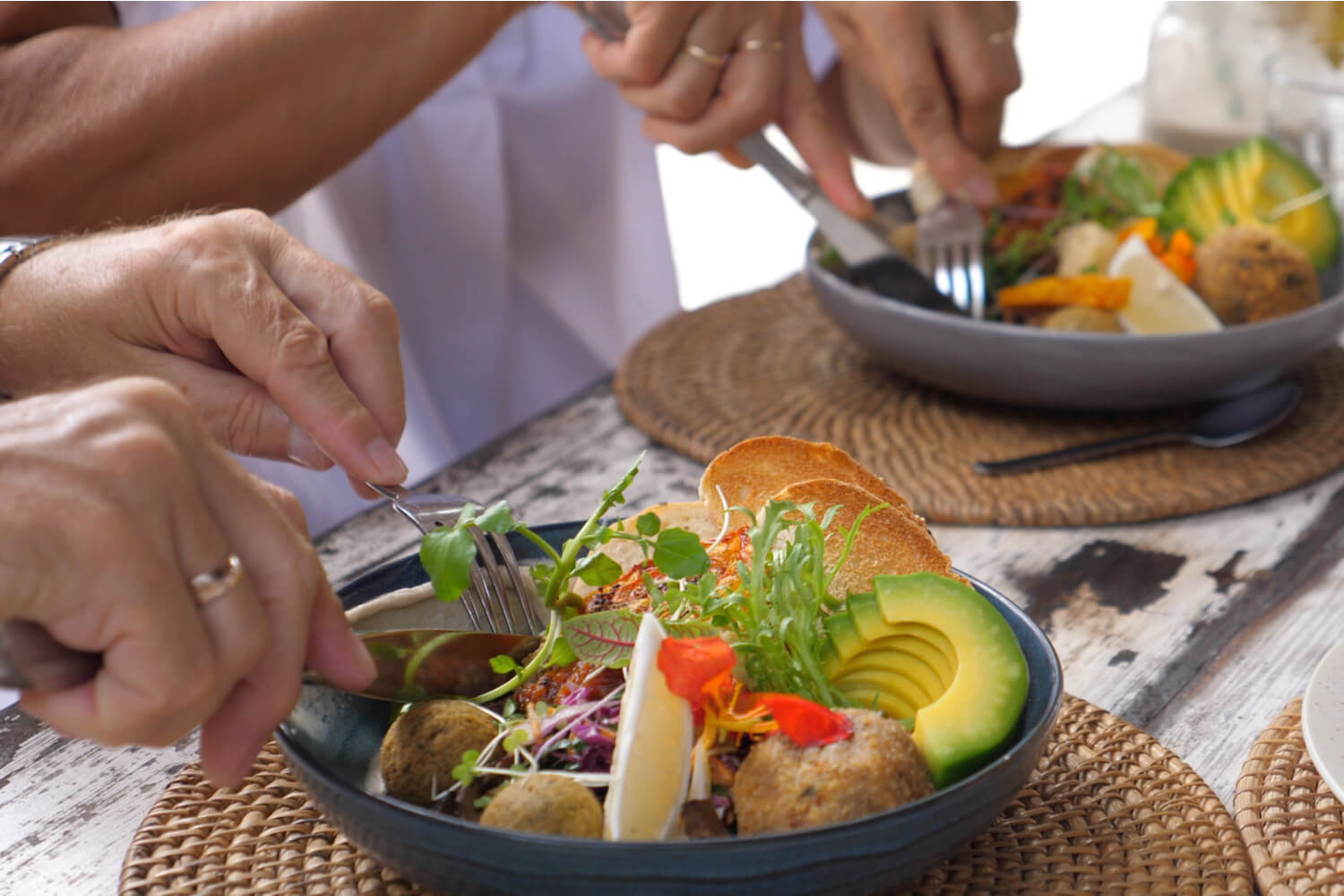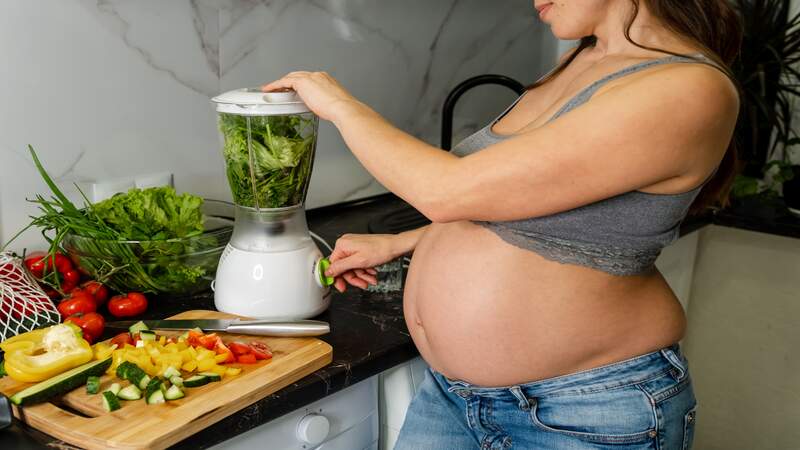
Pregnancy is a very beautiful period in a woman’s lifetime. While she enjoys this period, it also comes with the great responsibility of taking care of her and her baby as well. She needs to enjoy a wholesome diet and get maximum nutrients from the food that her baby requires.
During the pregnancy period, mothers and baby’s nutritional requirements increase. So, during this life stage, it becomes very important to get all the essential nutrients for the health and development of the baby. So, choosing smart and right choices of foods are very important during pregnancy.
What is a Balanced Diet?
A balanced diet is a wholesome diet that provides all the required nutrients in the right amounts. The right amount of calories, proteins, fats, vitamins, minerals and fiber. It is obtained from a diverse range of food items not from the single food group. (1)
Role of Balanced Diet During Pregnancy
 Mothers need to eat a healthy and balanced diet that provides the right amount of nutrients to the developing baby. If a mother does not eat a well-balanced diet it affects the baby in the womb. (2) (3)
Mothers need to eat a healthy and balanced diet that provides the right amount of nutrients to the developing baby. If a mother does not eat a well-balanced diet it affects the baby in the womb. (2) (3)
If the diet does not meet the requirements, then it may affect the normal growth and development of the baby (4) and may lead to irreversible damage to the baby’s health (5, 6)
Tips to Have a Balanced, Nutritional Diet During Pregnancy
 The dietary intake varies from person to person depending on their body type, age, height, weight etc. Consult a dietician for a proper diet plan and nutritional requirements. Get a complete body check-up. Refrain from eating foods which you are sensitive to. Besides following the below tips doing light physical exercise is good during pregnancy.
The dietary intake varies from person to person depending on their body type, age, height, weight etc. Consult a dietician for a proper diet plan and nutritional requirements. Get a complete body check-up. Refrain from eating foods which you are sensitive to. Besides following the below tips doing light physical exercise is good during pregnancy.
- Add a variety of fruits and vegetables to the diet to get all the essential vitamins and minerals that babies diet. Eat colorful fruits and dark green vegetables in the diet to get vit A, vit C, Vitamin E , iron and folate. (7) These are also important for the fiber requirement which reduces constipation (8).
- Folic acid intake minimizes the risk of neural defects and other similar complications. Make sure that you have lots of lentils, kidney beans, green leafy vegetables (spinach, romaine lettuce, kale, and broccoli), citrus fruits, nuts and beans as they are rich in folic acid.
- Protein is needed for energy, growth and development of body parts, especially brain, muscles and blood. A pregnant woman needs additional protein for the baby’s growth. Unsalted nuts and seeds make up for a good snack and are very rich in proteins. Seafood, lean meat and poultry, eggs, beans and peas, soy products are also excellent sources of proteins and should be made a part of your daily diet.
- Vitamin D is rarely found naturally in foods so proper supplementation or sunbath is necessary.
- Calcium is very essential for bones, teeth; blood’s clotting characteristics, regular heartbeat and nerves to function properly. Dairy products are the best source of calcium (19).
- Add a lot of fat-free dairy products, broccoli, kale yogurt, spinach, and cheese in the diet to get calcium to ensure strong bones of the baby. For the absorption of calcium, you need to add vitamin D in the diet for healthy bones and teeth of the body (10). Add fish, milk and eggs in the diet to promote the bone growth of the baby. (11)
- Iron is an essential component of red blood cells, which carry oxygen through the body. It aids in building resistance to stress and disease, reduces tiredness, weakness, irritability, and depression. Rich sources include whole grain products, lean beef and pork, dried fruit and beans, sardines, and green leafy vegetables.
- A woman’s blood volume increases during pregnancy and her body has to supply fluid to replenish the amniotic fluid the baby is in. Drinking enough water helps fight off morning sickness and helps in preventing constipation and ensures mom and baby are properly hydrated.
- Add a lot of wholegrains, cereals, legumes, pulses, lean meats, fish, eggs, tofu , nuts and seeds to ensure good fats and protein requirements of the baby. Add good fats in the diet like seeds, nuts and vegetable oils in the foods.
A mother must eat right and on a balanced diet during pregnancy. As babies grow in the womb, the nutritional requirements increase. These increased requirements of the baby need to be met, for the ideal growth and development of the baby. If mothers are not eating the right nutrition in the right amounts then this may harm the baby’s growth and development. Hence, A mother needs to make the right choice while choosing food for herself during the pregnancy.
FAQ’s
1. What Are The Best Foods To Eat Everyday During Pregnancy?
Eat a good amount of whole fruits, vegetables, whole grains, proteins, and low-fat dairy foods to ensure good nutrition for yourself and your baby.
2. What Is The Normal Diet Of Pregnant Women?
A normal diet for pregnant women should include all vegetables, whole grains, proteins, nuts, seeds, and fruits in the diet.
3. Which Trimester Is The Most Critical For Diet?
The first trimester of pregnancy is critical among the three trimesters. During this trimester the major parts of the babies are being developed. So, extra care should be given to the baby.
4. What To Eat For Baby Growth In Womb Week By Week?
A nutritious balanced diet is required during pregnancy which includes all the food groups in the diet. Fruits, vegetables, grains, lean proteins, low-fat dairy, and healthy oils and fats. One should not forget to take vitamins and minerals in the diet.
[Read Also: Nutritious Fruits To Eat During Pregnancy]
References
- ICMR, Dietary Guidelines Manual – https://www.nin.res.in/downloads/DietaryGuidelinesforNINwebsite.pdf
- Danielewicz H, Myszczyszyn G, Dębińska A, Myszkal A, Boznański A, Hirnle L. Diet in pregnancy-more than food. Eur J Pediatr. 2017 Dec – https://www.ncbi.nlm.nih.gov/pmc/articles/PMC5682869/
- Unicef, What to eat when pregnant – https://www.unicef.org/parenting/what-to-eat-when-pregnant
- OHSU, The Importance of Nutrition in Pregnancy and Lactation: Eat Better, Not More – https://www.ohsu.edu/school-of-medicine/moore-institute/importance-nutrition-pregnancy-and-lactation-eat-better-not-more
- NiDirect, Healthy eating in pregnancy – https://www.nidirect.gov.uk/articles/healthy-eating-pregnancy#
- MedlinePlus, Normal growth and development – https://medlineplus.gov/ency/article/002456.htm#
- BetterHealth Channel , Pregnancy and diet – https://www.betterhealth.vic.gov.au/health/healthyliving/pregnancy-and-diet#bhc-content
- Tommy’s org, How to eat well in pregnancy – https://www.tommys.org/pregnancy-information/im-pregnant/nutrition-in-pregnancy/balanced-diet-pregnancy
- Myhealthfinder, Eat Healthy During Pregnancy: Quick Tips – https://health.gov/myhealthfinder/pregnancy/nutrition-and-physical-activity/eat-healthy-during-pregnancy-quick-tips
- ACOG, Nutrition During Pregnancy – https://www.acog.org/womens-health/faqs/nutrition-during-pregnancy
- Mayo Clinic, Pregnancy diet – https://www.mayoclinic.org/healthy-lifestyle/pregnancy-week-by-week/in-depth/pregnancy-nutrition/art-20045082
